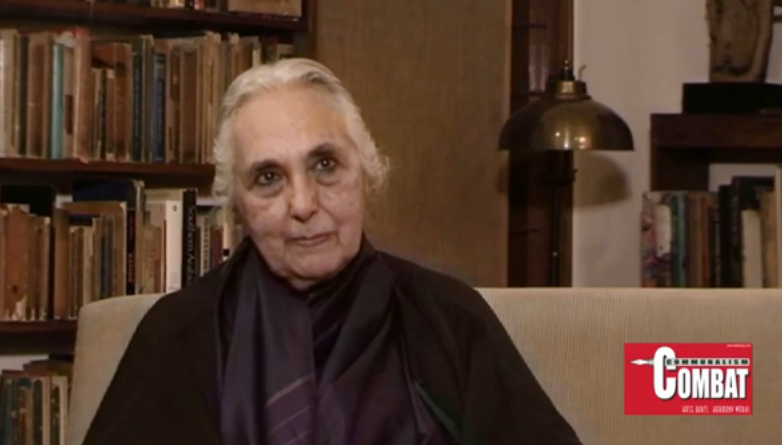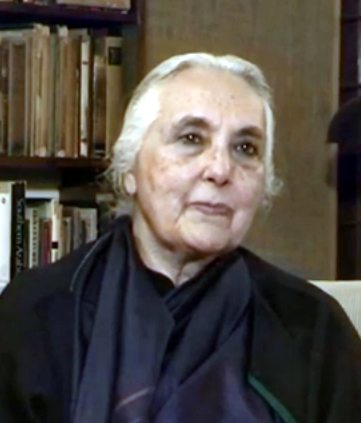|
|
|
||||||||||||||||||||
|
In an exhaustive and incisive interview Professor Romila Thapar, Emeritus Professor of History at the Jawaharlal Nehru University, Delhi and Hon D.Litt in both the University of Oxford and University of Chicago speaks to Teesta Setalvad in her special show on Communalism Combat and Hillele TV.
February 21, 2015
The function of the public intellectual is to make knowledge accessible and protect it from distortion, it is essential that knowledge advances through questioning says Professor Romila Thapar in a most exhaustive interview to Teesta Setalvad . In an exhaustive and incisive interview Professor Romila Thapar, Emeritus Professor of History at the Jawaharlal Nehru University, Delhi and Hon D.Litt in both the University of Oxford and University of Chicago speaks to Teesta Setalvad in her special show on Communalism Combat and Hillele TV. Twice that is in 1992 and 2005 she has refused the Padmabhushan a State Award, enhancing her stature even further. And in 2008 she has awarded the prestigious Kluge Prize for the Study of Humanity, an honour reserved for disciplines like history which are not covered by the Nobel Prize. An author of path breaking approaches to history, from Asoka and the Decline of the Mauryas to Past As Present: Forging Contemporary Identities through History, Professor Thapar has navigated the world of history through a multi-dimensional and incisive lens. She speaks on the criticality of independence and courage in the Public Intellectual especially today, given the authoritarian tendencies of the regime in power in New Delhi. Our early Indian traditions were questioning and skeptical always testing knowledge through the prism of rationality, and today faced with the p9olitical challenges dictated by the current regime in Delhi, it is essential that we proudly claim this tradition and not succumb to pre-dominant, irrational discourse, Thapar has stressed. Young persons must learn to understand that the very purpose of education is that we have an intelligent approach to knowledge gathering. The desperate need of the current dispensation to date our great epics, the Ramayana and the Mahabharata --when historians of repute have spent the past 80-100 years testing this –stems from a political motivation to claim Indian history, religion and tradition to a single, politically dominant discourse. Thapar explains succinctly that the Ramayana composed by Valmiki is one version of the epic, that the Buddhist Jataka (Dashrath Jatak) has another version of the same tale with even a Jain version coming after the Valmiki Ramayana. These are all different versions of the Ram Katha that offer fascinating insights into the early Indian period of history. This lengthy and detailed interview has also been broken into 12 parts for easy viewing, tackles these issues: how colonial historiography contributed to the seminal discourse and the motivations (political, economic and social)) behind the desecration of religious monuments in world history. It is critical for an understanding of how history should be approached and offers fascinating incites on early travelers into the Indian sub-continent, be it the Greeks, the Chinese or Al Beruni. Professor Thapar, in this conversation, that also delves into the sensitive issues of the gender dimensions of history, critical thinking and the constant duality within the Indian tradition that Megasthenes described as the two parallel streams represented by the ‘Brahmans’ and the ‘Shramans’ offers a complex understanding of our past that is invaluable.
Asoka’s
Dhamma and the Kalinga War, the great monarch and his relationship
with the people is discussed as is the true historiography behind the
narrative of the Somnatha temple and its destruction. The need of the
hour in India is for a real History of Science to be attempted, Thapar
says is critical. This is needed to ensure that real achievements from
early India are explored not as irrational claims but in understanding
how true knowledge in all fields emerged from deep observation and
evolved with rigorous scientific testing, Thapar says. Watch and
listen to the interview at
http://www.sabrang.com/cc/
|
|||||||||||||||||||||



